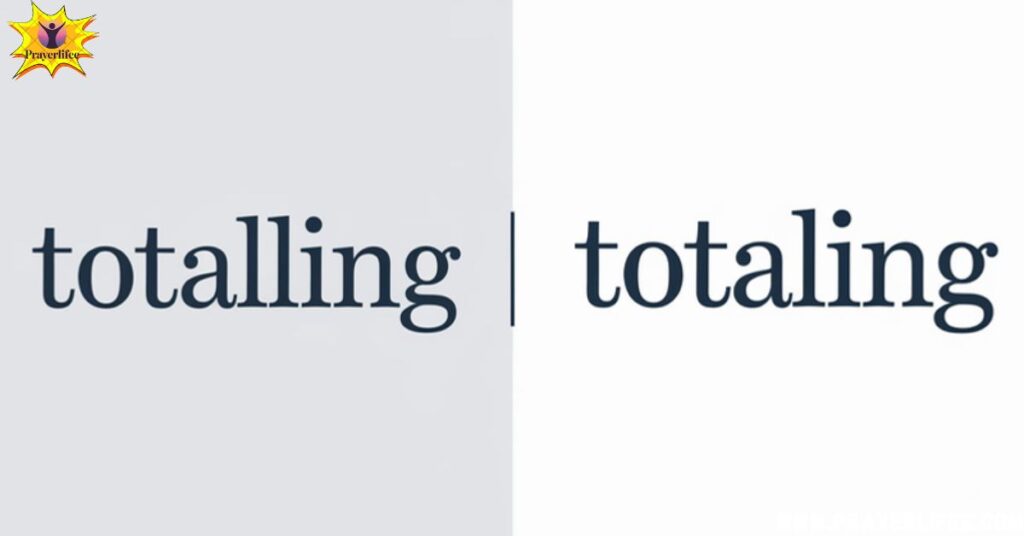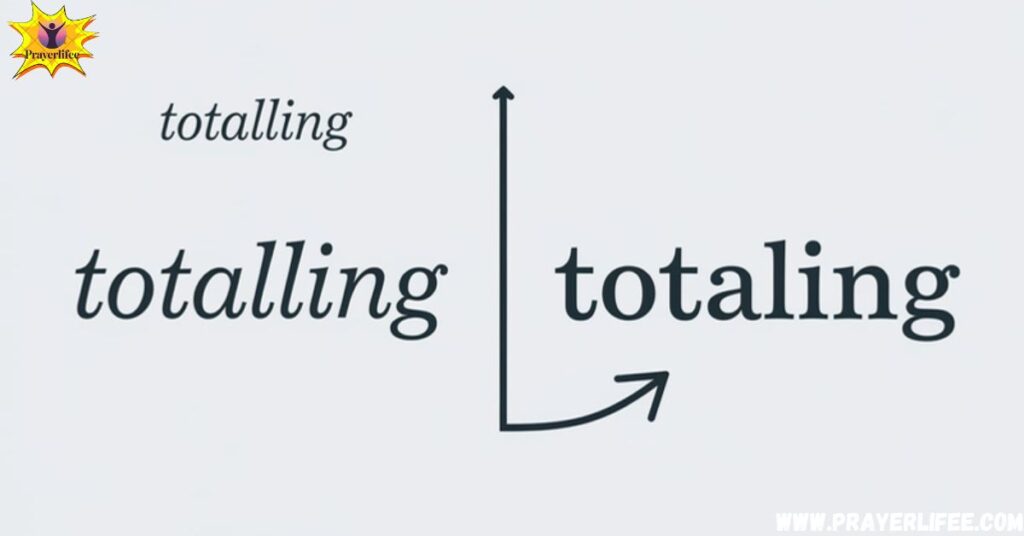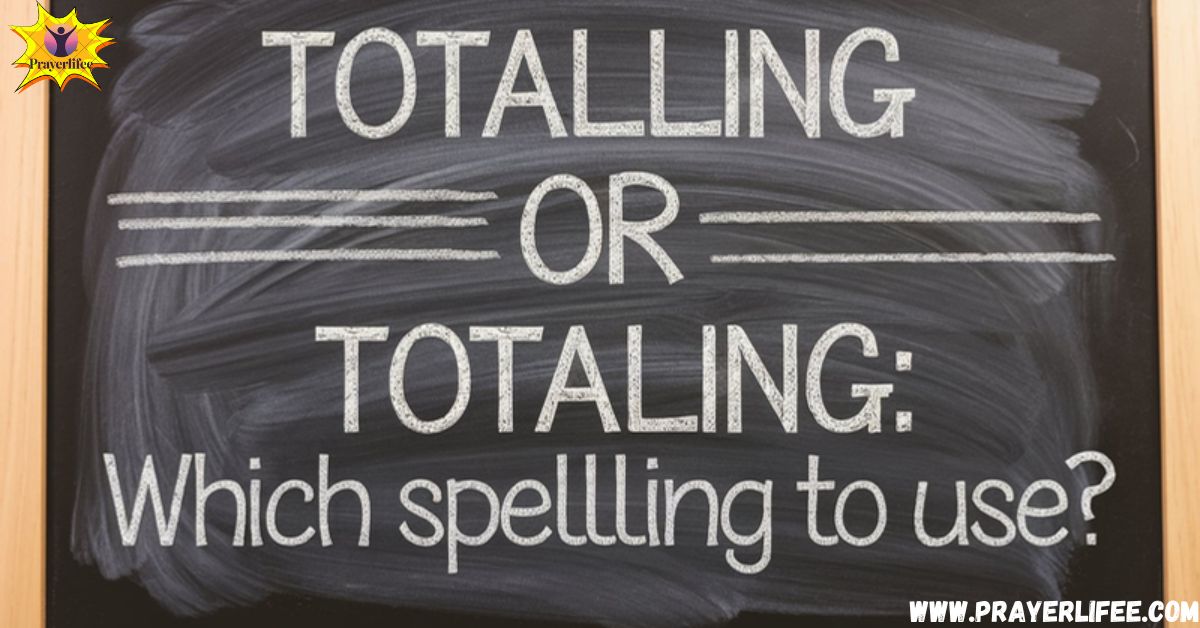When you write in English, one of the small but important details to get right is spelling. Even though the words “totalling” and “totaling” seem almost identical, their usage depends on where you are writing. Is it British English or American English? While both spellings are grammatically correct, understanding when and where to use each one is essential.
We will dive into the difference between totalling and totaling, explore why it matters, and provide some practical tips for professional writing.
Understanding Totalling vs Totaling

The words totalling and totaling both refer to the process of adding up or calculating the sum of something. They share the same meaning but are spelled differently depending on regional language conventions. Totalling is the preferred spelling in British English, while totaling is the standard in American English. The main difference lies in how the suffix “-ing” is added to verbs that end in a single vowel followed by a consonant. In British English, the consonant is doubled, while in American English, it is typically not.
So, why does this matter? It’s all about knowing your audience and making sure that your writing aligns with their expectations. If you’re writing for an American audience, use totaling. If you’re writing for a British audience, stick with totalling.
Why the Difference Matters
The difference between totalling and totaling might seem minor, but it plays a big role in ensuring your writing is clear and professional. In any formal setting—whether it’s an email, business report, or academic paper—accuracy in spelling helps reinforce your attention to detail and respect for your audience. If you’re working with a global audience, being aware of such spelling differences demonstrates cultural sensitivity and boosts your credibility.
For example, imagine you are writing a report to a British client using totaling instead of totalling. This small error may make the client feel you aren’t paying attention to detail. Similarly, using totalling for an American audience might confuse them and affect the professionalism of your work. Therefore, understanding when and how to use these spellings is an important aspect of professional communication.
The Correct Spelling of Totalling or Totaling
When it comes to choosing between totalling and totaling, context is key. Totalling is the correct form for British English, and totaling is the appropriate spelling for American English. If you’re writing for a British audience, always remember to double the consonant when adding the suffix “-ing” to verbs that end in a vowel followed by a consonant. This is part of the traditional British English spelling rule.
In contrast, American English tends to simplify spellings by avoiding unnecessary double consonants unless pronunciation requires them. That’s why Americans write totaling without doubling the “l.”
Example:
Let’s take a simple example to see the difference in action:
- British English: “The expenses totalling £20,000 were approved.”
- American English: “The expenses totaling $25,000 were approved.”
Here, you can see how the choice of spelling aligns with the regional convention.
Example Scenario: Email to a British Client
If you’re communicating with a British client, using totalling shows you understand British spelling rules and cultural expectations. Here’s how an email might look:
Dear Mr. Thompson,
I’ve attached the financial summary for this quarter. The total expenses totalling £10,000 are outlined in Section 4. Please review and let me know if you need any changes.
Best regards,
Emily
In this example, the correct usage of totalling aligns with British English expectations.
Example Scenario: Email to an American Client
On the other hand, when you are writing to an American client, using totaling is the right choice. Here’s an example:
Hi Mark,
I’ve attached the breakdown of this month’s expenses. The total costs, totaling $18,000, are detailed in the attached file. Let me know if you have any questions!
Thanks,
Amanda
In this case, totaling follows American English conventions, ensuring your communication is clear and professional.
The Influence of Noah Webster
The reason why totaling is used in American English and totalling in British English dates back to Noah Webster, the creator of the first American dictionary. Webster wanted to simplify English spelling to make it more logical and easier for learners. One of his changes was to remove unnecessary double consonants in words like totaling, canceling, and traveling. This is why American English often avoids doubling consonants, while British English sticks to the traditional spelling rules.
Webster’s impact on spelling can still be seen today in the way Americans write. His efforts were aimed at making English more phonetic, distinct from the British version, and easier for everyday use.
Read More: Journeys or Journies? Mastering the Correct Plural Form
British vs American Spelling Rules
British English and American English have several key spelling differences, and the rules for adding suffixes like -ing are just one example. Here’s a closer look at how both versions of English handle spelling:
British English
In British English, words like totalling follow the rule of doubling consonants when adding -ing. Other examples include:
- canceling becomes cancelling
- traveling becomes travelling
These rules maintain the traditional forms of the language, which are often derived from Latin or French influences.
American English
American English simplifies spelling by avoiding double consonants unless necessary for pronunciation. So, instead of totalling, traveling, or canceling, Americans write totaling, traveling, and canceling. This is part of the broader trend of simplification championed by Noah Webster.
British vs American Spelling Differences

To help you better understand these differences, here’s a comparison chart of some common spelling variations between British and American English:
| Word | British English | American English |
| Totalling/Totaling | Totalling | Totaling |
| Colour/Color | Colour | Color |
| Centre/Center | Centre | Center |
| Organise/Organize | Organise | Organize |
| Travelling/Traveling | Travelling | Traveling |
By understanding these key differences, you can adjust your writing based on your audience’s regional spelling preferences.
Synonyms for Totalling/Totaling
Instead of using totalling or totaling repeatedly, you can use synonyms to add variety to your writing. Here are some alternative phrases:
- Adding up
- Summing up
- Calculating
- Aggregating
- Computing totals
For example, instead of saying “The expenses totalling $100,000,” you could say “The expenses adding up to $100,000.”
Example in Practice
In professional contexts, such as financial reports or business communications, using synonyms can help you avoid redundancy. Here’s how you could rewrite a sentence:
- Original: “The expenses totalling $100,000 were reviewed.”
- Alternative: “The expenses adding up to $100,000 were reviewed.”
This approach helps maintain clarity and keeps your writing engaging.
Usage in British vs American English
British Usage: Totalling in Accounting and Finance
In British English, totalling is frequently used in formal settings, particularly in accounting and finance. It is common to see totalling in reports, summaries, and business documents. For example:
- “The expenses totalling £20,000 were submitted for approval.”
American Usage: Totaling in Everyday Speech
In American English, totaling is often used in everyday speech, as well as in formal documents. For instance:
- “The total costs, totaling $15,000, have been approved.”
Accounting and Calculating Totals
When it comes to accounting, whether you’re in the UK or the US, it’s important to use the correct spelling. Financial reports and calculations often use totalling or totaling to describe the process of summing figures. Ensuring you use the right spelling for your audience is crucial for professionalism.
Practical Tip:
Always check your organization’s style guide or language preferences when preparing financial documents. This helps avoid errors and ensures you are using the correct regional spelling.
Accountant’s Report for British Audiences
For British audiences, here’s an example of a financial report:
“The year-end summary indicates total expenses totalling £250,000.”
Accountant’s Report for American Audiences

For American audiences, the same report would look like this:
“The year-end summary indicates total expenses totaling $320,000.”
These examples highlight how adjusting spelling according to the audience helps maintain professionalism and clarity.
Spelling Conventions in English
English spelling conventions have evolved over time, and understanding the differences between British and American English is vital for effective communication. The choice between totalling and totaling is just one example of how language varies based on region and historical influences.
Key Differences:
- British English tends to follow traditional spelling rules, like doubling consonants.
- American English simplifies spelling to make it more consistent and phonetic.
Knowing these rules will help you ensure that your writing aligns with your audience’s expectations.
Practical Tips for Consistency
To ensure your writing is clear and professional:
- Understand your audience: Always consider whether your readers are familiar with British or American English.
- Use writing tools: Software like Grammarly can help identify and adjust spelling based on regional preferences.
- Follow style guides: Refer to style guides like APA, Chicago, or MLA to ensure consistency in your writing.
Conclusion: Totalling or Totaling?
In conclusion, whether you use totalling or totaling depends on your audience. If you’re writing for a British audience, use totalling. If you’re writing for an American audience, use totaling. Understanding these small spelling differences can help you improve your writing and ensure you communicate clearly and professionally. Always check your audience’s expectations, and remember, the goal is clarity and precision in your writing.
By paying attention to such details, you ensure that your work remains accurate, professional, and tailored to your readers’ preferences.
FAQs
What is the difference between “totalling” and “totaling”?
The difference between “totalling” and “totaling” lies in regional spelling: “totalling” is used in British English, while “totaling” is used in American English.
When should I use “totalling”?
You should use “totalling” when writing for a British audience.
Why does the spelling differ?
The spelling difference stems from historical changes in American English, influenced by Noah Webster’s reforms.
Is one spelling more correct than the other?
Neither spelling is more correct than the other; it depends on your audience’s regional preferences.
Can I use either spelling in professional writing?
Yes, you can use either spelling in professional writing, as long as it’s consistent with your audience’s expectations.

